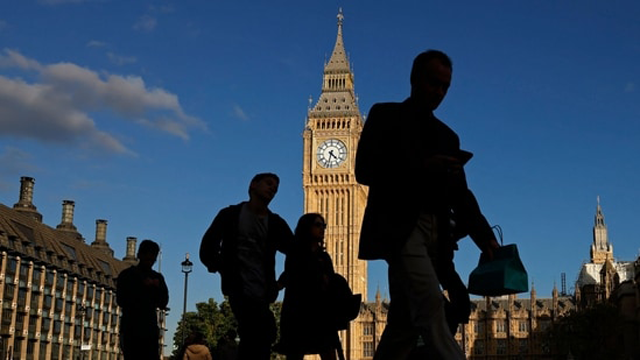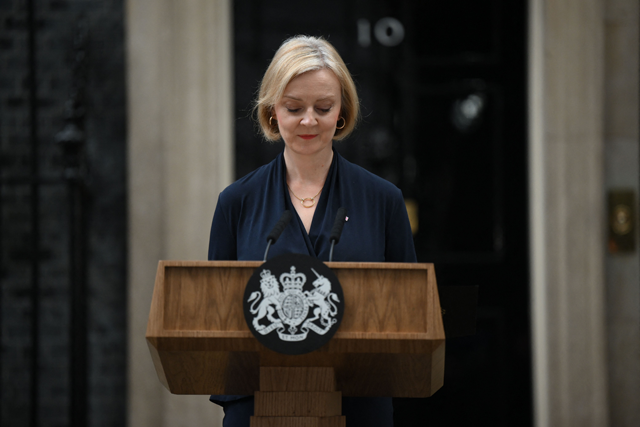You are here
UK budget predicted to be a nightmare before Christmas
By AFP - Nov 16,2022 - Last updated at Nov 16,2022
LONDON — Britain will Thursday hike taxes and slash public spending in a government budget that signals a return to austerity despite a cost-of-living crisis and recession headwinds.
Conservative Prime Minister Rishi Sunak, who took office just three weeks ago, has vowed to fix the economic havoc created by his short-lived predecessor Liz Truss.
Even though he is mindful of soaring energy bills and food prices with UK inflation at a 40-year high and interest rates ballooning, the budget is widely seen as triggering a new era of austerity, similar to the one that followed the 2008 global financial crisis.
Finance Minister Jeremy Hunt will present his crucial budget in parliament, alongside official growth and inflation forecasts unlikely to bring joy to an economy battered also by Brexit and costly government help during the COVID pandemic.
“Tackling inflation is my absolute priority and that guides the difficult decisions on tax and spending we will make,” Hunt said Tuesday.
“Restoring stability and getting debt falling is our only option to reduce inflation and limit interest rate rises,” he added after official data showed UK unemployment creeping up.
Chancellor of the Exchequer Hunt is expected to unveil tax hikes and spending cuts of up to £60 billion ($70.5 billion) to bring down debt, media reports suggested.
Heading into the budget, he has likened himself to the penny-pinching miser Ebenezer Scrooge in Charles Dickens’ festive favourite “A Christmas Carol”.
Recession
Britain is likely already in recession after its economy shrank in the third quarter and is set to do so again in the final three months of the year, according to the Bank of England (BoE).
The BoE, which is raising interest rates to combat sky-high inflation, has warned the UK economy may experience a record-long recession until mid-2024.
It comes after the central bank went on an emergency buying spree of UK government bonds after Truss’s unfunded tax-slashing budget sparked a collapse in the pound and an explosion in state borrowing costs during her 49-day tenure.
That cost her the leadership, but not before Truss had fired her finance minister Kwasi Kwarteng, replacing him with Hunt.
The new chancellor has set about reversing the much-criticised budget by curtailing a freeze in domestic fuel bills that have surged largely owing to the invasion of Ukraine by major energy producer Russia.
Reports suggest that Hunt will now go further, freezing income tax rate thresholds, meaning more people are dragged into higher tax brackets.
To help the poorest with rocketing energy bills, the government is expected to ramp up a windfall tax on oil and gas giants, whose profits have surged on fallout from the Ukraine war.
The Financial Times on Tuesday added that Hunt is preparing a windfall tax on firms generating electricity, whose profits have also soared this year.
‘Devastating consequences’
The pound and bond markets have regained somewhat of an even keel after Sunak took the helm and political turmoil subsided, but retail lenders’ mortgage rates remain elevated.
“I would really want people to be reassured that... all the decisions we make will have fairness and compassion at their heart,” Sunak said this week.
Hoping that Sunak sticks to his word, chief executives of Britain’s biggest supermarkets published an open letter Tuesday urging the government to offer free school meals to far more children than the very poorest.
“We are committed to doing all we can to support [children]..., with several actions set to be implemented in the coming months, but we cannot do this alone,” said the letter co-signed by bosses of supermarkets including Britain’s biggest retailer Tesco.
“We strongly urge you to consider the scale of children’s food insecurity across the UK and act without delay to prevent its devastating consequences.”
‘Austerity 2.0’
Britain’s main opposition Labour Party has slammed Sunak, arguing that a second wave of austerity is not the answer.
“I don’t believe that austerity 2.0, after the austerity that we have gone through... is the right approach,” said Labour’s finance spokeswoman Rachel Reeves.
“Public services are already on their knees,” added Reeves, calling it a “badge of shame” that nurses were planning to strike this winter.
Tens of thousands of staff in various industries have already gone on strike across Britain this year as inflation erodes wages.
Related Articles
LONDON — The five remaining Conservative candidates to become Britain’s next prime minister clashed Friday night over tax and honesty in pol
LONDON — British inflation has jumped to a 41-year high on soaring energy and food bills in a worsening cost-of-living crisis, data showed W
LONDON — British Prime Minister Liz Truss on Thursday announced her resignation just six crisis-filled weeks after taking office, becoming t














